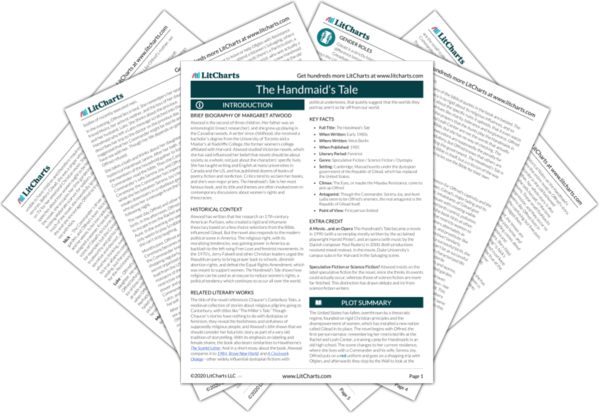Summary
Analysis
Offred wakes suddenly when Cora drops the breakfast tray. She’d fallen asleep in the closet, which greatly alarms Cora for some reason. Offred lies and says she must have fainted in the closet, which makes Cora excited about it being an early sign of pregnancy. Offred and Cora decide that it’s less suspicious just to lie that Cora dropped the tray on her way out. Offred is pleased that Cora is willing to deal with Rita’s displeasure on her behalf.
Though Cora’s concern and slight rule-breaking may seem like exceptional kindness, her interest above all in Offred’s fertility situation suggests that she’s just another of the many in Gilead who care about Offred only for her body and what it can do.
Themes
The narrative jumps forward. All the previous action took place in May, and now it’s summertime, and the tulips are gone. Returning from a grocery trip, Offred sees Serena Joy cutting off the tulips’ seed pods, destroying the fruit to make next year’s flowers better. Offred wishes she had the shears.
Serena is the destroyer of the plants’ fertility, making them useless to pass on genes, so they will be more beautiful. Since Offred and the tulips are symbolically linked via color, it’s almost as though Serena Joy is attacking Offred. Serena’s actions also symbolically describe her own role: to be beautiful for her husband, but not to bear a baby.
Themes
Offred thinks more about the garden, the irises and bleeding hearts that seem so feminine and dramatic that she finds them “subversive.” The flowers manage to break through the earth and make themselves known, and the whole atmosphere is romantic and luxurious. Offred continues to enjoy tempting the checkpoint guards, and wishes for winter to keep her in check.
Despite Serena Joy’s violent attempts to control the flowers, Offred sees how the natural world of the garden is at odds with Gilead’s rigidity. An innocent hobby to occupy the Wives may be unexpectedly rebellious.
Themes
Offred and the Commander continue to meet in secret, when Nick signals, either by polishing the car when Offred walks by, or wearing his hat incorrectly. Offred finds it difficult to sneak around Serena Joy, and sometimes can’t make the appointments. Sometimes Serena Joy goes out at night to visit sick Wives. For the Wives, being sick is fun, but sick Handmaids and Marthas mysteriously disappear.
Offred’s predicament illustrates how Gilead hasn’t created a “women’s culture,” as Offred imagines in Chapter 21. Instead, Gilead manages to divide women through hierarchy and jealousy. Offred and Serena Joy hate each other, not the system that forced them into these roles.
Themes
Get the entire The Handmaid’s Tale LitChart as a printable PDF.

At first Offred found the Commander’s requests funny and anticlimactic, compared to the sexual perversions she’d expected. At their second meeting, they played more Scrabble and Offred realized that he’d let her win at the last meeting. Then the Commander gave Offred a Vogue magazine to read. Before Gilead, Offred hadn’t cared much for these magazines, but now she desperately wanted to read it.
It’s fitting that the first thing the Commander gives Offred to read is a fashion magazine, a manual on a type of femininity that no longer exists, that Gilead and the Commander himself as a leader of Gilead eliminated. Vogue exemplifies both the freedoms and the stresses on pre-Gilead women. It is important to note that pre-Gilead women also had ideals to conform to—ideals communicated by Vogue and culture, though not enforced by the government.
Themes
At first, Offred turned down the Vogue, but the Commander said that she was allowed to read it. Offred notes the almost masculine confidence of the supermodels, and their makeup. Though Aunt Lydia would find this evil, Offred just finds it “naughty.”
The word “naughty” connotes something playful, flirty and childlike. Though the consequences of this rebellion could be serious, here we see Offred taking Gilead’s rules lightly.
Themes
Offred asked why the Commander had saved a magazine that should have been burned, and the Commander said that certain people could keep what the masses shouldn’t. After he sadly said that he didn’t have anyone else to show it to, Offred boldly suggested that he could have shown it to Serena Joy. The Commander explained that he and his wife didn’t communicate, and Offred understood why the Commander wanted to see her instead.
The Commander’s belief that some people could break Gilead’s rules shows that he also takes the government lightly—even though he played a role in creating it. He may be elitist, but he also understands the importance of having some freedoms. He’s certainly hypocritical, but honest about his issues.
Themes
At their third meeting, Offred requested lotion. The Commander laughed at the fact that she’d been using butter, and she felt angry. He gave her the lotion four days later, and she explained that she couldn’t keep it in her room. The Commander hadn’t even realized the degree to which the Handmaids were spied on, and Offred became angry explaining it to him. But he told her she could keep the lotion in his office.
Strangely, the Commander wasn’t even aware of Offred’s treatment. This suggests that the lack of empathy between characters may not be because of personal hatreds, but because the structure of Gilead is so opaque that no one knows each other’s experiences.
Themes












